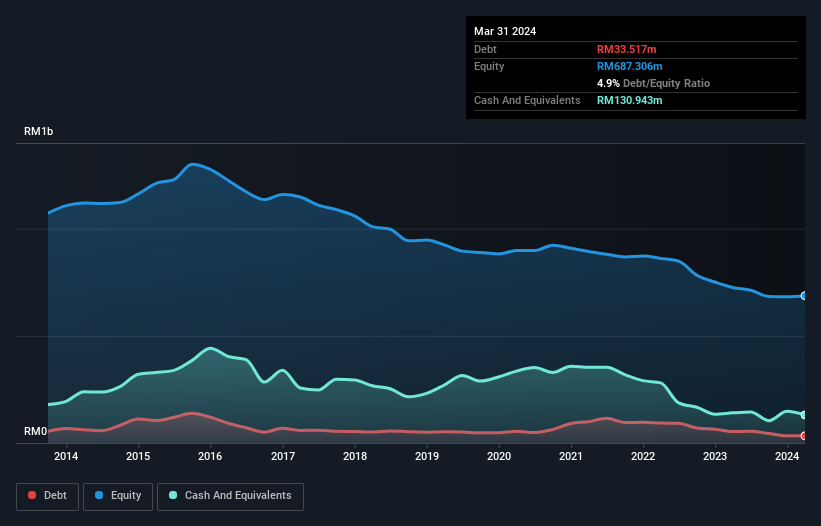- Malaysia
- /
- Tech Hardware
- /
- KLSE:JCY
Health Check: How Prudently Does JCY International Berhad (KLSE:JCY) Use Debt?
Howard Marks put it nicely when he said that, rather than worrying about share price volatility, 'The possibility of permanent loss is the risk I worry about... and every practical investor I know worries about.' When we think about how risky a company is, we always like to look at its use of debt, since debt overload can lead to ruin. We note that JCY International Berhad (KLSE:JCY) does have debt on its balance sheet. But the more important question is: how much risk is that debt creating?
What Risk Does Debt Bring?
Debt and other liabilities become risky for a business when it cannot easily fulfill those obligations, either with free cash flow or by raising capital at an attractive price. If things get really bad, the lenders can take control of the business. While that is not too common, we often do see indebted companies permanently diluting shareholders because lenders force them to raise capital at a distressed price. Having said that, the most common situation is where a company manages its debt reasonably well - and to its own advantage. When we think about a company's use of debt, we first look at cash and debt together.
See our latest analysis for JCY International Berhad
How Much Debt Does JCY International Berhad Carry?
As you can see below, JCY International Berhad had RM33.5m of debt at March 2024, down from RM53.6m a year prior. However, it does have RM130.9m in cash offsetting this, leading to net cash of RM97.4m.

How Healthy Is JCY International Berhad's Balance Sheet?
The latest balance sheet data shows that JCY International Berhad had liabilities of RM99.6m due within a year, and liabilities of RM1.24m falling due after that. Offsetting these obligations, it had cash of RM130.9m as well as receivables valued at RM196.5m due within 12 months. So it can boast RM226.6m more liquid assets than total liabilities.
It's good to see that JCY International Berhad has plenty of liquidity on its balance sheet, suggesting conservative management of liabilities. Because it has plenty of assets, it is unlikely to have trouble with its lenders. Succinctly put, JCY International Berhad boasts net cash, so it's fair to say it does not have a heavy debt load! When analysing debt levels, the balance sheet is the obvious place to start. But you can't view debt in total isolation; since JCY International Berhad will need earnings to service that debt. So when considering debt, it's definitely worth looking at the earnings trend. Click here for an interactive snapshot.
Over 12 months, JCY International Berhad saw its revenue hold pretty steady, and it did not report positive earnings before interest and tax. While that hardly impresses, its not too bad either.
So How Risky Is JCY International Berhad?
While JCY International Berhad lost money on an earnings before interest and tax (EBIT) level, it actually generated positive free cash flow RM4.2m. So taking that on face value, and considering the net cash situation, we don't think that the stock is too risky in the near term. With mediocre revenue growth in the last year, we're don't find the investment opportunity particularly compelling. The balance sheet is clearly the area to focus on when you are analysing debt. However, not all investment risk resides within the balance sheet - far from it. For example, we've discovered 2 warning signs for JCY International Berhad that you should be aware of before investing here.
At the end of the day, it's often better to focus on companies that are free from net debt. You can access our special list of such companies (all with a track record of profit growth). It's free.
New: Manage All Your Stock Portfolios in One Place
We've created the ultimate portfolio companion for stock investors, and it's free.
• Connect an unlimited number of Portfolios and see your total in one currency
• Be alerted to new Warning Signs or Risks via email or mobile
• Track the Fair Value of your stocks
Have feedback on this article? Concerned about the content? Get in touch with us directly. Alternatively, email editorial-team (at) simplywallst.com.
This article by Simply Wall St is general in nature. We provide commentary based on historical data and analyst forecasts only using an unbiased methodology and our articles are not intended to be financial advice. It does not constitute a recommendation to buy or sell any stock, and does not take account of your objectives, or your financial situation. We aim to bring you long-term focused analysis driven by fundamental data. Note that our analysis may not factor in the latest price-sensitive company announcements or qualitative material. Simply Wall St has no position in any stocks mentioned.
Have feedback on this article? Concerned about the content? Get in touch with us directly. Alternatively, email editorial-team@simplywallst.com
About KLSE:JCY
JCY International Berhad
An investment holding company, engages in the trading, manufacturing, and assembling of hard disk drive components and other mechanical components in Malaysia, Thailand, and internationally.
Flawless balance sheet and good value.
Market Insights
Community Narratives





